Russian occupiers “forced out” Anna Moskaliuk, a worker at the “Hryvna” newspaper, from her native city of Kherson. After they offered her three-year-old son to shoot, she fled for her life, saving both her child and herself. Anna recounted her experiences with NUJU journalists, discussing checkpoints, conversations with occupiers, shot-up cars with people, and the native blue-and-yellow flag.
On February 24, a call from her mother woke Anna. It was very early, around 4:50 a.m., and the call brought no good news.
— My mother said that the war had started. At first, I didn’t understand. It was almost night, and it seemed like it was all a dream because believing such a thing was impossible— Anna recalls that horrifying morning.
But powerful explosions, like a cold shower, quickly woke her up to reality. Tanks’ gun barrels loomed from all sides on the peaceful Kherson residents. The city was on the brink of full occupation.
— A powerful explosion sounded. My mother works in the center, but she lives a bit further. I called her, but she didn’t answer. It was frightening, terrifying thoughts were rushing into my mind. Then, when she called me back, it turned out there were tanks in the city: they were driving on the streets and shooting as if announcing that they had ‘arrived,’— continues our interviewee.
Yet, instead of a welcome with bread and salt, the occupiers encountered unyielding resistance from Kherson’s citizens.
— Protests began. I call them ‘protests of unbroken spirit.’ People came out to prevent anyone with heavy equipment from entering the city, but the occupiers didn’t care. I thought they would come in and it would all be over in a day or two,— Anna Moskaliuk reflects. — But not only in two days but also in two weeks, nothing ended. I was very afraid of nightfall. We saw in the news that they were entering private homes and apartments, taking people and killing them.
“A tank stopped, and an occupier asked the child: ‘Do you want to shoot?'”
But that wasn’t the worst of it. One day, Anna was walking with her son on a playground. Suddenly, a tank with a “Z” emblem stopped beside them. A soldier emerged from the hatch and looked at Anna’s son with scrutiny.
—…And an occupier asked the child, ‘Do you want to shoot?’ It was very frightening. I took the child, and we never left the yard again,— the media worker says, her voice trembling, recalling the incident.
— Once, my son asked me, ‘Whose soldiers are these? Are they good or bad?’ I said they were Russian soldiers, and they were bad. He understood everything,— Anna states.
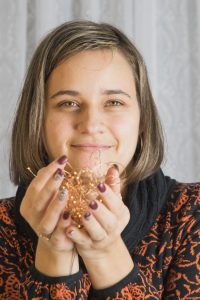 “I knew that if I said the wrong thing, they would just kill us.”
“I knew that if I said the wrong thing, they would just kill us.”
After enduring two months of occupation, life became insufferable. Weekly, Anna’s family prepared for evacuation, but hesitation turned resolute: “All or none.” Within two hours, they departed. The city’s streets were desolate. Damaged cars, both civilian and occupier, littered the roads. These nightmarish scenes are etched deep into Anna’s memory.
— I can’t forget this journey, I will remember it as long as I live. A road of fear, death, and uncertainty. When we left the city’s central roads, we saw wrecked cars. Right in front of us, on the main street of the city, there was a shot-up car with people who were trying to leave a bit earlier before the curfew ended,— Anna describes the beginning of the evacuation.
They managed to pass through the checkpoints at the outskirts of Kherson quickly. The Russians hardly checked anything. But the closer Anna’s family got to the demarcation line, the more meticulous the invaders became.
— At some checkpoints, they were quite amusing because they didn’t look like soldiers, and at others, there were ‘kadiryvtsi’ [Members of the Russian-backed separatist forces or irregular armed groups. These individuals are often associated with a more aggressive and militarized presence at checkpoints and in war zones.] – They were very scary and fully equipped from head to toe: head, face, arms, legs, back, chest… When we were almost reaching Bakhchisaray (the sixth or seventh checkpoint), the occupiers were dressed in old sports suits, sneakers, and gardening gloves (I suppose they took all this from local residents). They had rifles. One said to another, ‘Go to their car because they filmed us with a camera. She has no right to film my face because I don’t want to appear on their television.’ He approached me, gestured to unlock the doors, and said, ‘Get out.’ When I sit for a long time, I have difficulty standing up due to my spinal injury, — says the media worker. — I took out all the things I had. He saw my injured legs and said, ‘What are you worried about? We’ve come to visit you.’ I knew that if I said the wrong thing, they would just kill us. I said, ‘I don’t need such guests; I need to go home. I have a child behind me.’ And I started to cry. Then, he stepped back and allowed us to continue.
Tears of happiness welled up in Anna’s eyes the next time. After passing the gray zone, she finally saw the blue-and-yellow flag and our soldiers.
— They stood in the bushes and signaled for us to pass quickly. There was a checkpoint further ahead. We stopped. I got out of the car and hugged that guy. I understood perfectly well that these people were protecting me, they wouldn’t harm me or my children,— our interviewee says.
“I Missed Kherson Right Away”
Currently, Anna lives with her family in Kalush. She cares for her son, who will soon be three years old, while her husband works. She follows the news from Kherson very attentively and plans to return to her homeland next summer.
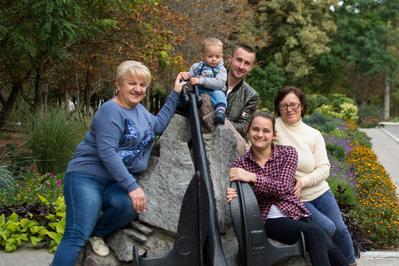
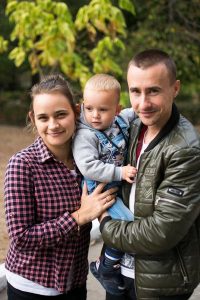
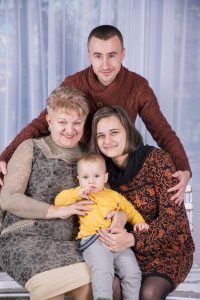
— I missed Kherson right away. I’m a very warm-loving person; it’s hard for me to adapt and get used to new conditions. It was very painful to realize that we were leaving the city for the unknown, that it was a journey for an indefinite period. I had to understand that I couldn’t pack my bags and go home at any moment, and this feeling was simply unbearable. I really want to be home next summer, in my sunny hometown,— says Anna Moskaliuk, a worker at the “Hryvna” newspaper.
This series, titled Executed Free Speech, is created as part of a project Drawing Ukrainian And International Audience’s Attention To Serious Violations Of Human Rights And Crimes Against Journalists And Mass Media By The Russian Federation, which is performed by the National Union of Journalists of Ukraine, with support from the Swedish non-profit organization Civil Rights Defenders.
JOURNALISTS ARE IMPORTANT. Stories of Life and Work in Conditions of War is a cycle of materials prepared by the team of the NUJU with the support of the Swedish human rights organization Civil Rights Defenders.
#CRD

 THE NATIONAL UNION OF
JOURNALISTS OF UKRAINE
THE NATIONAL UNION OF
JOURNALISTS OF UKRAINE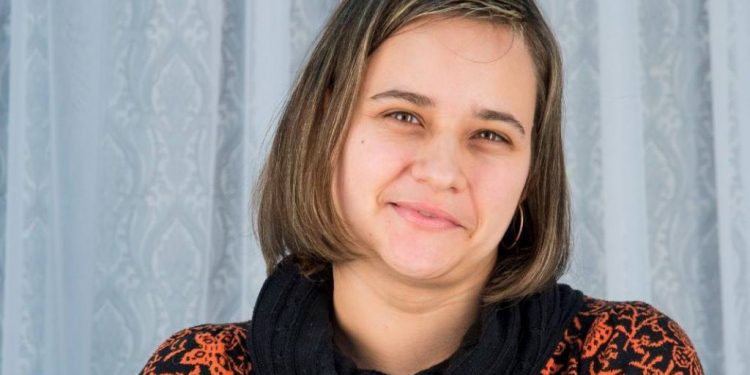
















Discussion about this post